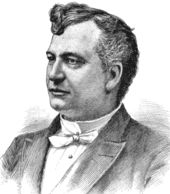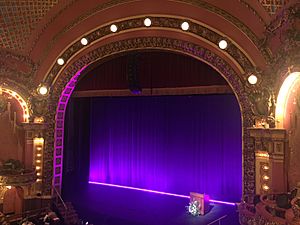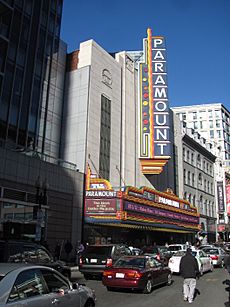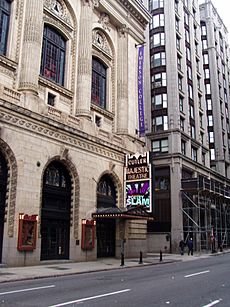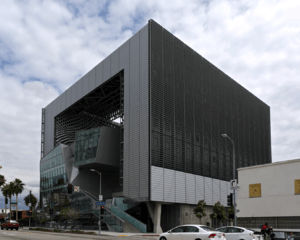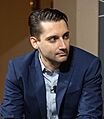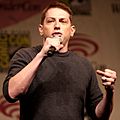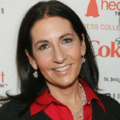Emerson College facts for kids
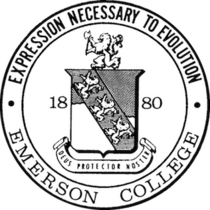 |
|
|
Former names
|
Boston Conservatory of Elocution, Oratory, and Dramatic Art (1880) Monroe Conservatory of Oratory (1881–1889) Emerson College of Oratory (1890–1938) |
|---|---|
| Motto | "Expression Necessary to Evolution" |
| Type | Private college |
| Established | 1880 |
| Founder | Charles Wesley Emerson |
| Accreditation | NECHE |
| Endowment | $259.6 million (2021) |
| President | Jay M. Bernhardt |
|
Academic staff
|
469 (2019) |
| Students | 5,900 (2022) |
| Undergraduates | 4,117 (2022) |
| Postgraduates | 1,783 (2022) |
| Location |
,
,
United States
|
| Campus | Large City, 8 acres (0.032 km2) |
| Newspaper | The Berkeley Beacon |
| Other campuses |
|
| Colors | Purple Gold |
| Nickname | Lions |
|
Sporting affiliations
|
|
| Mascot | Griff the Lion |
 |
|
Emerson College is a private college located in Boston, Massachusetts, United States. It also has campuses in Los Angeles and in Well, Limburg, Netherlands (at Kasteel Well). The college was started in 1880 by Charles Wesley Emerson as a "school of oratory" (public speaking).
Emerson College offers many different programs that focus on arts and communication. These programs are built on a strong foundation of liberal arts studies. The college is also known for its public opinion poll, Emerson College Polling.
The college has moved several times within Boston. It is now located in the Theater District next to the Boston Common. Emerson owns and runs the historic Colonial, Paramount, and Cutler Majestic theaters. It also has several smaller places for performances.
Contents
- History of Emerson College
- Emerson College Campus
- Academic and Theater Buildings
- Ansin Building (180 Tremont Street)
- 216 Tremont Street
- Walker Building (120 Boylston Street)
- Tufte Performance Production Center (10 Boylston Place)
- Cutler Majestic Theatre (219 Tremont Street)
- Paramount Center (555 Washington Street)
- Piano Row (150 Boylston Street)
- Little Building (80 Boylston Street)
- 2 Boylston Place
- Programs Outside Boston
- Academic and Theater Buildings
- Academics at Emerson College
- Athletics at Emerson College
- Student Organizations
- Presidents of Emerson College
- Notable People from Emerson College
- See also
History of Emerson College
How Emerson College Started
Charles Wesley Emerson started the Boston Conservatory of Elocution, Oratory, and Dramatic Art in 1880. This was a year after Boston University closed its own School of Oratory. The first classes were held at Pemberton Square in Boston, with ten students.
The next year, the school changed its name to the Monroe Conservatory of Oratory. This was to honor Professor Lewis B. Monroe, who was Charles Emerson's teacher at Boston University.
In 1890, the name changed again to Emerson College of Oratory. It was later shortened to Emerson College in 1939.
Early Growth and Changes
The college grew and moved to different locations in Boston, including Odd Fellows Hall. In 1892, the college opened its first library. Faculty members bought the college from Dr. Emerson around 1900.
Dr. Emerson retired in 1903. William J. Rolfe, a Shakespearean scholar, became the second president. He retired in 1908.
In 1908, Henry Lawrence Southwick became the third president. He added acting and stagecraft to the college's classes. During his time, Emerson became the first school with a college-level program in children's theater in 1919. The school also offered its first course in Journalism in 1924.
The college bought its first building in 1931, which was a dormitory for women. They also started intramural sports (sports played within the college) like volleyball.
New Programs and Locations
In 1930, the college's leaders gave full control to the Board of Trustees. Harry Seymour Ross became the fourth president in 1931. During his time, the first class in radio broadcasting was taught.
Emerson College also bought buildings at 130 Beacon Street and 128 Beacon Street in Boston's Back Bay. They owned these buildings until 2003.
In the years that followed, Emerson offered new programs. These included professional training in speech pathology (1935) and the first college program in broadcast journalism (1937) in the United States. The college also gained the right to give out Master of Arts degrees.
After World War II
After World War II, more men started attending Emerson College. This was partly because of the G.I. Bill of Rights, which helped veterans go to college. The college also started new activities for students. This led to the first issue of Emerson's student newspaper, The Berkeley Beacon, in 1947. This newspaper is still published today.
Emerson's broadcasting program also grew a lot. In 1949, the FCC gave the college a license for a radio station. This led to WERS, the first educational FM radio station in New England. The station's power increased over the next few years.
In 1950, Emerson College became a member of the New England Association of Colleges and Secondary Schools. This group checks if schools and colleges meet certain standards.
Financial Challenges and Recovery
In 1952, the college faced serious money problems. A group of former students helped raise money to save the college. This effort led to a new board of trustees, mostly made up of alumni. They chose S. Justus McKinley, a former history professor, as the fifth president.
After getting through its financial crisis, the college added new programs and facilities. In 1953, Emerson opened The Robbins Speech, Language and Hearing Clinic. This helped the Communication Sciences and Disorders Program. In 1954, a television studio was opened, and the first closed-circuit TV program was shown the next year. The college was also allowed to give honorary degrees and other Bachelor's and Master's degrees.
Emerson's Campus in Back Bay
In the 1960s, Emerson College continued to grow its campus in the Back Bay area of Boston. They bought more buildings for dorms, dining halls, and offices. The college library moved into its own building at 303 Berkeley Street. By 1964, the campus was mostly in Back Bay.
Richard Chapin became the seventh president in 1967. He helped create new general education requirements for students. In 1972, the college was allowed to give BFA and MFA degrees.
Moving to the Theater District
Emerson College has moved to different places within Boston. In 1979, Allen E. Koenig became the ninth president. He tried to move the college completely out of Boston and merge it with another school, but this plan did not work out.
In the 1980s, Koenig suggested big changes to the college's buildings. This included new performance spaces, classrooms, and offices. In 1984, the college bought 335 Commonwealth Avenue for administration and the Communication Studies department. They also gained the right to give MFA degrees in Creative Writing.
There was also talk of moving the college to Lawrence, Massachusetts. However, this plan was eventually stopped when Koenig resigned in 1989. In 1988, the college bought a building at Zero Marlborough Street for dorms and a dining hall.
John Zacharis became the tenth president in 1989. He worked to bring the college together after the failed move to Lawrence. He bought a building at 180 Tremont Street, now called the Ansin Building. This started the move from Back Bay to the Boston Theater District.
After Zacharis passed away, Jacqueline Weis Liebergott became the first female president of the college in 1992. She created a plan to move the college to the Washington Street Theatre District.
In the mid-1990s, the college started offering health care benefits to partners of gay and lesbian faculty and staff. In 1995, the college got a gift that helped them create The Tufte Lab and install a new network for telecommunications.
In 1994, Emerson bought and started restoring The Little Building, which is across from the Ansin Building. In 1998, Emerson bought the Walker Building (Boston) at 120 Boylston Street. This building now holds many departments, the library, and classrooms.
Early 2000s Developments
The Tufte Performance Production Center (PPC) opened in 2003. This 11-story building has two theaters, two television studios, and offices for the Department of Performing Arts. The Cutler Majestic Theatre also finished its renovations and reopened as a main stage for Emerson Stage shows.
In 2004, Emerson announced that some buildings in Back Bay would be sold. Construction began on a new 14-story residence hall at 150 Boylston Street, which opened in 2006. This was the first completely new dorm in Emerson's history.
The school bought Boston's historic Paramount Theatre in 2005. They planned to build a new complex there, including a theater, a smaller "black box" theater, a film screening room, rehearsal studios, a sound stage, and a dormitory.
In 2006, the Campus Center in the Piano Row building was named the Max Mutchnick Campus Center. This was after a large gift from Max Mutchnick, a graduate who co-created the TV show Will & Grace. That same year, the school bought the Colonial Theatre and added 372 dorm rooms on its upper floors.
In September 2007, gender-neutral bathrooms were added on Emerson's campus. By September 2016, all bathrooms on campus were made gender-inclusive.
In 2010, the newly renovated Paramount Center officially opened. It includes the Paramount Theatre, a black box theater, a screening room, a sound stage, and rehearsal studios.
In 2019, Marlboro College merged with Emerson. Marlboro gave its money to Emerson, and Emerson created the Marlboro Institute of Liberal Arts and Interdisciplinary Studies. Marlboro students were guaranteed admission to Emerson.
Recent Years (2020-Present)
In December 2020, President Lee Pelton announced he would leave Emerson College in June 2021. Jay M. Bernhardt became the 13th president of Emerson College on June 1, 2023.
Emerson College Campus
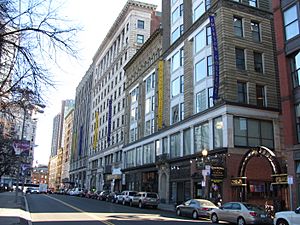
Emerson College's move to its current location helped improve and keep the special look of the neighborhoods around it. These areas have many important historic places, like the Boston Public Garden and Boston Common. Most of the college's buildings were already there and were fixed up or restored.
The 8-acre campus is in the city, at the corner of Boylston Street and Tremont Street. It is close to the Boylston and Chinatown subway stations. Besides its Boston campus, Emerson College also has a campus in the Netherlands (a 14th-century castle) and a large center on Sunset Boulevard in Hollywood.
Academic and Theater Buildings
Ansin Building (180 Tremont Street)
Emerson bought the Ansin Building in 1992. This 14-story building has all the labs and facilities for Visual & Media Arts (VMA) and offices for VMA and Writing, Literature & Publishing (WLP) departments. It is also home to WERS radio, WECB, and ETIN (Emerson's Talk and Information Network).
216 Tremont Street
This building holds the Department of Communication Sciences and Disorders and its clinic, The Robbins Speech, Language and Hearing Center. It also has offices for Student Financial Services, Health Services, and Career Services. The Bill Bordy Theater on the ground floor is used for talks and performances.
Walker Building (120 Boylston Street)
The Walker Building has classrooms, study rooms, offices, and five computer labs. It also houses the Iwasaki Library and the Emerson College Archives.
A set from the popular TV show Will & Grace was once displayed in the Iwasaki Library. This set, which was Will and Grace's living room and kitchen, was later moved to Emerson's Los Angeles campus in 2013.
Tufte Performance Production Center (10 Boylston Place)
This 11-story building has two television studios, two performing arts theaters, and studios for sets and costumes. It also has classrooms and offices for the Department of Performing Arts.
Cutler Majestic Theatre (219 Tremont Street)
The Cutler Majestic Theatre is where Emerson Stage productions are held each year. It also hosts speaking events and the EVVY Awards, which is Emerson's own student-run award show.
Paramount Center (555 Washington Street)
The Paramount Center opened in 1932 as a movie theater. In 2005, Emerson College planned to fix up the Paramount Theatre and build a whole new performing arts center around it. The renovated Paramount Center was finished in 2010.
The project included fixing up the Paramount Theatre into a 550-seat theater. It also added a new Performance Development Center and a new dorm for the school on the upper floors. The complex has a 120-seat "black box" theater, a screening room, a sound stage for film students, and rehearsal studios.
Piano Row (150 Boylston Street)
Piano Row is a 14-story building that houses 558 students. Inside, students can find The Max Mutchnick Campus Center and the Bobbi Brown and Steven Plofker Gymnasium. The Campus Center has meeting and rehearsal spaces for students. The gym is Emerson College's first indoor sports facility.
Little Building (80 Boylston Street)
Emerson College bought the Little Building in 1994 and turned it into a dorm with 750 beds. It opened in 1995. In 2016, the college planned a full renovation of the building, which added more beds. The renovated dorm opened in 2019 and now houses up to 1,035 students.
The Little Building is home to the Student Performance Center (SPC). This space has the Judee Wales Watson Theater, the SPC Black Box, two dance studios, and rehearsal rooms.
2 Boylston Place
2 Boylston Place is the newest building on campus. It opened in 2017 and is an 18-story dorm that houses about 375 students.
Programs Outside Boston
ELA—Hollywood Center (Los Angeles)
The Emerson Los Angeles (ELA) building is located on Sunset Boulevard in Hollywood. It is a permanent home for Emerson's Los Angeles program, which has been around for decades. The 10-story building opened in 2014. It can hold 217 students, which is about twice as many as Emerson's older facility.
Students can spend a full semester taking classes in Hollywood and doing an internship related to their studies. ELA also offers training for professionals in the Los Angeles area.
Kasteel Well in the Netherlands
Emerson College owns and runs Kasteel Well in the Limburg, Netherlands. This is a national historical monument that provides living spaces, classrooms, and other facilities. About 85 Emerson students attend the program there each semester.
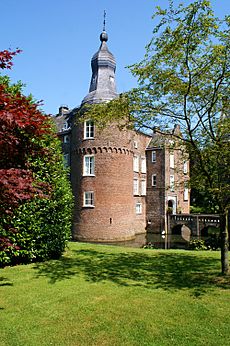
Classes are taught by teachers from the Netherlands and other parts of Europe. Each semester, Emerson takes students on a trip to Amsterdam and another European capital like Prague, Venice, or Barcelona.
Academics at Emerson College
| Forbes | 222 |
|---|---|
Emerson College has two main schools: the School of Communication and the School of the Arts. These schools offer many different majors and minors. While the college focuses on communications and the arts, students also take classes in other subjects like liberal arts and sciences.
U.S. News & World Report ranks Emerson College among the top Regional Universities North. In 2021, it was ranked 8th overall in this category.
In 2018, Emerson accepted 36% of students who applied. As of 2019, there were 3,871 undergraduate students and 1,048 graduate students. About 76% of students receive financial help like scholarships or loans.
Film Studies
Emerson College has a large film program, one of the biggest in the United States. In 2008/2009, it gave out 368 degrees in film, radio, and television. In August 2022, The Hollywood Reporter ranked Emerson's Visual and Media Arts program as #6 in the nation. Emerson also has a special program with Paris College of Art in France called the Global BFA in Film Art, which started in 2019.
Journalism Program
The journalism major at Emerson College is very popular for students interested in media. It is often ranked highly by college guides. The program focuses on hands-on learning, where students go out and report stories.
Marketing Programs
The college offers undergraduate programs in Marketing Communications and Business of Creative Enterprises. Emerson's Department of Marketing Communication also has graduate degrees in Integrated Marketing Communication and Global Marketing Communication & Advertising.
In 2014, USA Today named Emerson #5 on its list of top 10 U.S. colleges for a marketing degree.
Engagement Game Lab
The Engagement Game Lab at Emerson College is a research lab that helps people get involved in their communities in new ways. It also studies how people act as citizens in the digital age. Professionals run the lab, but students also help out.
Athletics at Emerson College
Emerson College is part of the National Collegiate Athletic Association (Division III). Its sports teams are called the Lions. The college has men's and women's teams for lacrosse, tennis, basketball, cross country running, golf, volleyball, and soccer. There is also a women's softball team and a men's baseball team.
In 2007, the women's softball team won the GNAC championship. In 2012, Emerson's women's volleyball team won the GNAC Champions title. In 2019, the men's basketball team won its first NEWMAC title. In 2022, the women's soccer team won the NEWMAC title.
Student Organizations
Emerson College has over 100 student organizations. These groups are very active and cover many interests, from class-related activities to social action. Students lead most of these organizations.
The EVVY Awards
The EVVY Awards are Emerson College's yearly award show. It is the largest student-run TV production in the country. Industry professionals judge the awards, which recognize student achievements in their chosen fields. The show is broadcast live from the Cutler Majestic Theatre every May. More than 500 students work on the EVVY Awards each year.
The 31st and 33rd Annual EVVY Awards won a College Television Award for Alternative/Variety programming.
Emerson Channel
The Emerson Channel is Emerson College's television station. It was created in 1999 and is managed by a full-time staff member, but students run the channel. Student work on the Emerson Channel often wins EVVY awards.
Emerson Independent Video
EIV was started in 1975 and is Emerson's largest student-run organization. EIV helps produce live news, TV plays, and other shows chosen by students. EIV is known for its award-winning show, EIV News at 9p.
Student Magazines and Newspapers
Emertainment Monthly
Emertainment Monthly is Emerson College's official entertainment magazine. It is like professional entertainment journalism magazines. Emertainment Monthly has been nominated for several EVVY Awards and covers major entertainment events.
The Berkeley Beacon
The Berkeley Beacon is Emerson's student-run weekly newspaper. In 2012, it became the first college newspaper website with a design that works well on different devices.
Student Performance Groups
The college has several student groups that focus on theater. These include the BlueJay Theatre Collective, the emShakes Theatre Co. (which performs Shakespeare), Kidding Around (theater for young audiences), and the RareWorks Theatre Company (which produces new plays). There are also dance groups like the Emerson Dance Company and the Emerson Urban Dance Theatre.
Student Radio
WECB is the campus student-run radio station. It broadcasts online and on campus television.
ETIN (Emerson's Talk and Information Network) is an online talk radio service run by students. It is located in the same space as WERS and WECB.
Comedy Groups
Emerson College has a long history in comedy. There are many student groups that specialize in sketch comedy, improvisation, and short films. Some of these groups include Emerson Comedy Workshop, Chocolate Cake City, and Inside Joke.
The college also offers comedy classes like "Comedy Writing for Television." In September 2016, the college started offering a B.F.A. in Comedic Arts, which was the first degree of its kind in the country.
The Emerson College Comedy Scholarship is given each year to a student who shows leadership and talent in comedy writing, performing, or directing. The college is also home to the American Comedy Archives, which collects materials from famous comedians.
Presidents of Emerson College
- Charles Wesley Emerson (1880–1903)
- William James Rolphe (1903–08)
- Henry Lawrence Southwick (1908–32)
- Harry S. Ross (1932–45)
- Boylston Green (1945–49)
- Samuel Justus McKinley (1949–67)
- Richard Chapin (1967–75)
- Gus Turbeville (1975–77)
- Oliver Woodruff (1977–79)
- Allen E. Koenig (1979–89)
- John Zacharis (1989–92)
- Jacqueline Liebergott (1992–2011)
- M. Lee Pelton (2011–2021)
- William Gilligan (Interim president, 2021–2023)
- Jay Bernhardt (2023–present)
Notable People from Emerson College
-
Jay Leno,
comedian and former host of The Tonight Show -
Daniel Scheinert & Daniel Kwan, writers and directors of the Oscar-winning film Everything Everywhere All At Once.
-
Morton Dean,
journalist and former television anchor for CBS Evening News -
Norman Lear,
television producer known for All in the Family, The Jeffersons and Good Times -
Paul Thomas Anderson,
filmmaker known for Boogie Nights, Magnolia and There Will Be Blood -
David Cross,
comedian and actor known for Mr. Show and Arrested Development -
Bill Burr,
comedian and actor known for Paper Tiger and Breaking Bad -
Henry Winkler,
actor known for Happy Days, Arrested Development, and Barry -
Ben Collins,
reporter for NBC News and The Daily Beast -
Paul Dini,
screenwriter and co-creator of Batman: The Animated Series -
Doug Herzog,
former president of MTV Networks -
Vin Di Bona,
producer of MacGyver, Entertainment Tonight, and America's Funniest Home Videos -
Andrea Martin,
actress known for Pippin, SCTV, and My Big Fat Greek Wedding -
Bobbi Brown,
author and entrepreneur -
Denis Leary,
actor and co-creator of Rescue Me -
Suzan Johnson Cook,
advisor to President Bill Clinton -
David Foster Wallace,
author of Infinite Jest -
Maria Menounos,
journalist and media personality
See also
 In Spanish: Emerson College para niños
In Spanish: Emerson College para niños
 | Emma Amos |
 | Edward Mitchell Bannister |
 | Larry D. Alexander |
 | Ernie Barnes |


